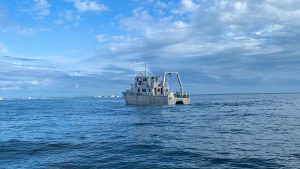Phase 1 of Smart Reef System installed off S.C. coast
October 21, 2020Partnership between S.C. Floodwater Commission and Coastal Carolina University will generate offshore and marine information in real time
PHASE ONE of a sensor-laden “smart [ocean] reef” system capable of gathering critical marine and weather information was installed off the South Carolina coast, Fri., Oct. 16, about five nautical miles from Little River Inlet just south of the N.C.-S.C. border.
With the aid of several boats directed by Coastal Carolina University’s (CCU) research vessel as well as a team of SCUBA divers – including S.C. Floodwater Commission Chairman Tom Mullikin, S.C. Sen. Stephen Goldfinch, and Jonathan Zucker, board chair of the Charleston-based South Carolina Aquarium – two sensor-laden concrete blocks were lowered onto and affixed to the Ron McManus Memorial Reef.
The installation was the first of three phases which will enable scientists and researchers at CCU to collect wave, storm, and other data in real-time in order to facilitate better modeling as regards storm impacts, flooding, surge measurement, and various threats to the coast and the economies impacted by all.
According to WPDE-TV (the ABC affiliate station covering Myrtle Beach, the Grand Strand and the Pee Dee): “The sensors will help researchers study hurricanes, floods, low oxygen levels or potential spills.”
A critical information-gathering project says Mullikin who adds, “This system is designed to gather data that will be processed into actionable information that will better enable our state’s engineers and environmental experts who will use what they glean from this system to develop new and better ways of protecting the lives and property of all South Carolinians.”
Dr. Paul T. Gayes, director of CCU’s Burroughs and Chapin Center for Marine and Wetland Studies which co-led the development and installation of the smart reef system’s phase one project with the S.C. Floodwater Commission, agrees.
“Ultimately, the data will continue to aid the development and increase the resolution of the CCU interactively coupled Ocean, Wave, Atmosphere and Flood model system leading to improved predictive capability related to environmental quality, habitat change and storm effects within the artificial reef system and broader coastal zone of northern South Carolina,” says Gayes.
Data generated by the Smart Reef system will become publicly available as a part of the South East Atlantic (SEA) Econet; a system of 100 weather stations across the Southeastern U.S. which feeds the National Weather Service’s modeling system.
The reef site is one of 43 artificial reef sites managed by the S.C. Dept. of Natural Resources’ Artificial Reef Program.
– Photo courtesy of Simon Williams, WPDE.





















